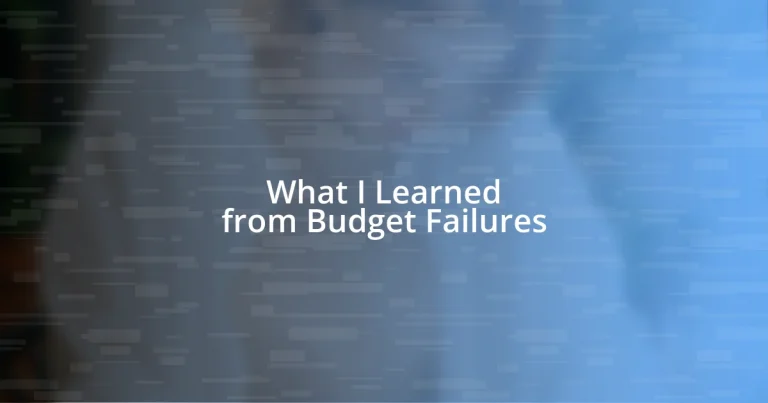Key takeaways:
- Understanding budgeting is essential for aligning financial habits with personal goals, emphasizing the need to differentiate between needs and wants.
- Common budgeting failures include underestimating expenses, emotional spending, and not reviewing budgets regularly; recognizing these pitfalls promotes financial growth.
- Creating a flexible budget involves regular adjustments, collaboration with family or friends, and learning from past mistakes to establish accountability and support.
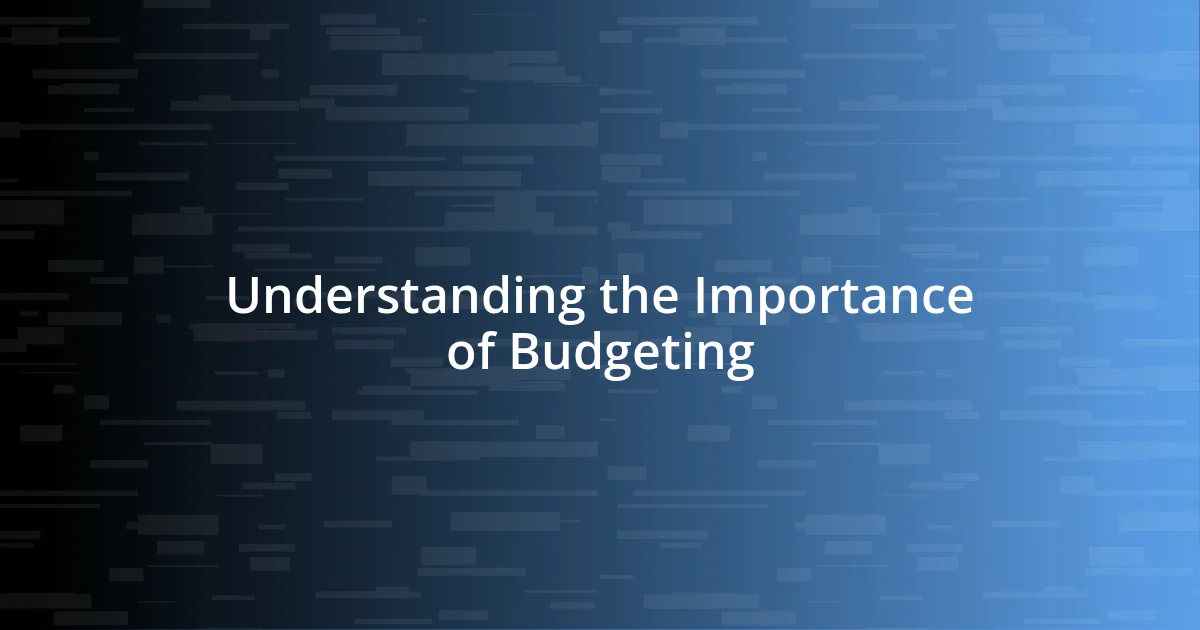
Understanding the Importance of Budgeting
Budgeting is more than just crunching numbers; it’s about making informed decisions that align with our life goals. I remember when I first attempted to track my spending diligently. At first, it felt tedious, but I was surprised to see how a few small adjustments could lead to significant savings. Have you ever experienced that moment when you realize where your money’s really going?
When I reflect on my own budgeting journey, I can’t help but share how it’s taught me the importance of prioritizing my needs versus wants. For instance, I once splurged on a few unnecessary gadgets that seemed enticing at the moment. But what I really desired was to save up for a vacation I’d dreamed about for years! Budgeting, I found, guides us to make choices that ultimately create a more fulfilling life.
Understanding the importance of budgeting truly shines through in the lessons it teaches about discipline and self-awareness. Every time I closely examined my financial habits, I discovered patterns that revealed my values and priorities. It’s a bit like holding up a mirror—what do you see reflecting back? The beauty of budgeting is that it empowers us to shape our lives intentionally rather than letting our finances dictate our paths.
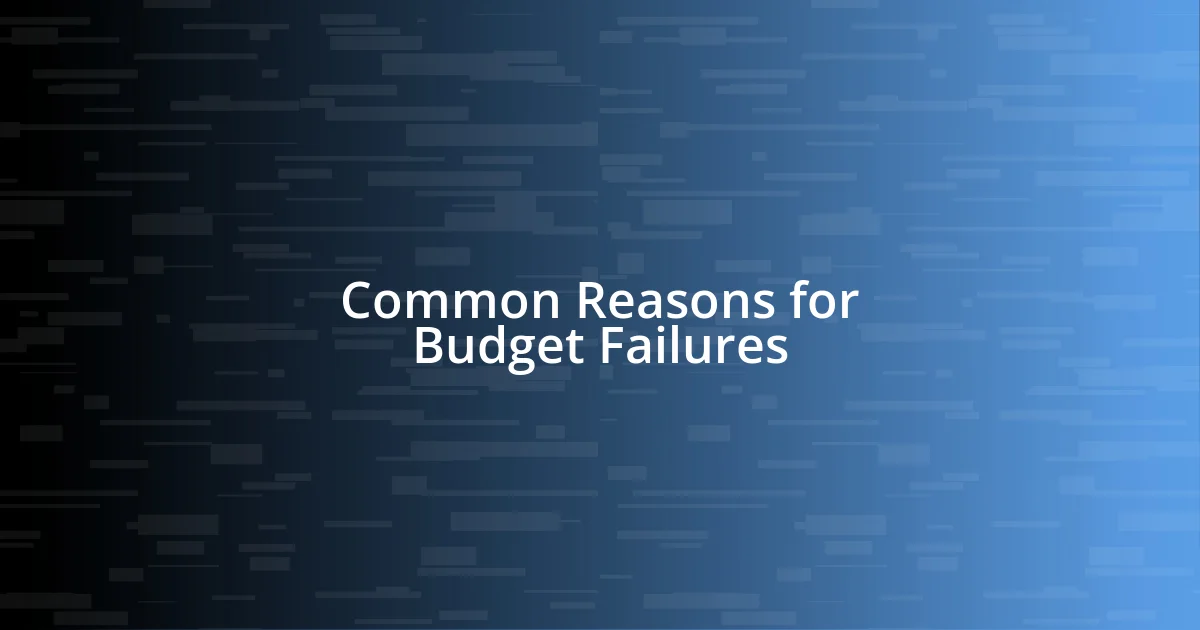
Common Reasons for Budget Failures
There are several reasons why budgets often stumble, and I’ve certainly encountered my fair share of obstacles. One of the most common pitfalls is underestimating expenses. I remember a time when I thought my grocery bills would be straightforward, only to realize I frequently splurged on snacks and takeout. It feels like those little expenses sneak up on you, and before you know it, they derail your budget entirely.
Here’s a concise list of some prevalent reasons for budget failures:
- Inflated Income Estimates: Overly optimistic projections about earnings can lead to inadequate planning.
- Inadequate Tracking: Failing to keep a close eye on daily expenditures often results in overspending.
- Lack of Emergency Fund: Unforeseen expenses, like car repairs or medical bills, can wreak havoc if there’s no buffer in place.
- Emotional Spending: Sometimes, we turn to shopping as a form of comfort, forgetting about our financial goals.
- Neglecting to Review and Adjust: Budgets aren’t static; I learned the hard way that regular reviews are essential for keeping things on track.
Recognizing these budget failures helps in understanding where I need to focus my attention. It’s a continuous learning process, and each mistake provides an opportunity for growth in my financial journey.

Identifying Personal Spending Patterns
Identifying personal spending patterns is a crucial step in mastering your budget. Over time, I made it a habit to categorize my expenses; I was amazed by what I discovered. I realized that my coffee shop visits, though seemingly innocuous, added up to a small fortune each month! Have you ever looked closely at a seemingly harmless expense only to find it warrants a second look?
Analyzing spending patterns allows for a deeper understanding of what drives our purchases. One month, I meticulously tracked every dollar spent and found that dining out was my biggest weakness. It wasn’t just about the food but also the experiences and connections I valued. Yet, this realization pushed me to find a balance between enjoying life and sticking to my financial goals. How could I embrace similar experiences in a more budget-friendly way? I started hosting cooking nights with friends instead of meeting at expensive restaurants, creating memories without the hefty price tag.
To map out these patterns effectively, it helps to establish a consistent tracking method. I began using an app to record my daily expenses and found it enlightening to visualize my habits over time. Not only did this tactic bring clarity, but it also fostered accountability. Breaking my expenses into categories—like groceries, entertainment, and savings—highlighted areas needing improvement. When was the last time you analyzed where your money truly goes? By identifying these patterns, I took control of my finances instead of letting them control me.
| Spending Categories | Example Expenses |
|---|---|
| Coffee & Snacks | $100/month |
| Dining Out | $300/month |
| Groceries | $250/month |
| Entertainment | $150/month |

Setting Realistic Financial Goals
Setting realistic financial goals is essential if you want to avoid the traps that led me to budget failures. I remember the excitement of setting an ambitious goal, like saving $10,000 in a year, only to face frustration when unexpected costs piled up. It made me realize that overreaching without considering my actual income and expenses could lead to disappointment rather than motivation. Have you ever felt that rush of setting a goal only to see it slip away?
My approach shifted when I decided to break my larger goals into smaller, achievable milestones. For instance, instead of focusing solely on the $10,000, I outlined a monthly target of $833, which felt much more attainable. This not only kept me motivated but also allowed me to celebrate small victories along the way. When I hit that $833 mark one month, it was like a little victory dance in my living room! It felt rewarding and reinforced my commitment to my budget.
Moreover, I learned to incorporate flexibility into my goal-setting process. Life is unpredictable—expenses will surprise you, and that’s okay. Once, an unexpected car repair threatened my savings plan, but because I had set my goals realistically, I could adjust without throwing everything off balance. How do you make adjustments when life throws curveballs? Embracing some leeway in my financial goals has turned what once felt like stress into a more manageable, enjoyable journey.
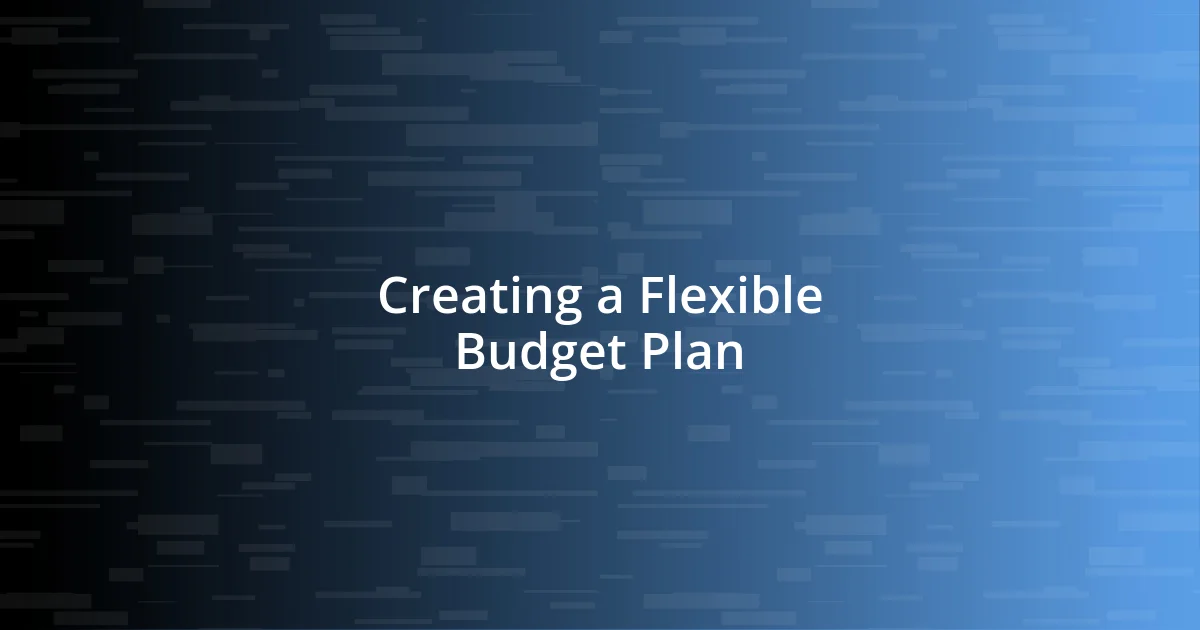
Creating a Flexible Budget Plan
Creating a flexible budget plan is vital for navigating the financial ups and downs we all face. In my experience, I found that building a budget isn’t just about numbers; it’s more like a dynamic roadmap. For instance, when I originally budgeted for a family vacation, I didn’t account for the possibility of a last-minute vet bill for my dog. Adjusting my budget on the fly taught me to always include a “buffer” for unplanned events. Have you ever felt overwhelmed by unexpected expenses?
One of the key aspects of a flexible budget is regular review and adjustment. Initially, I was hesitant to revisit my budget frequently, thinking it would disrupt my flow. But then, I noticed how much my lifestyle and priorities shifted over just a few months. After realizing I was spending less on dining out and more on hobbies, I adapted my budget to reflect that change. I felt empowered by this control, and it transformed budgeting from a chore into a meaningful exercise. Have you tried looking at your budget as a living document rather than something set in stone?
Additionally, involving my family in the budgeting process has been a game changer. When we came together to discuss our financial goals, it felt less like a strict regimen and more like a team effort. I remember the time we wanted to save for a family camping trip and decided to work as a unit. Our discussions helped us prioritize needs and desires without feeling deprived. This collaborative approach didn’t just enhance our finances; it strengthened our family bonds as well. Have you included your loved ones in your budgeting journey?

Learning from Past Mistakes
Learning from past budgeting failures is essential for growth. I remember a time when I overlooked the importance of tracking my spending. It took a frustrating month of overspending for me to realize that without attention to detail, I was setting myself up for failure. Have you ever felt like your finances were spiraling out of control? When I started logging every expense, I discovered patterns and triggers. It was like turning on the light in a dim room; suddenly, I could see where my money was going and adjust accordingly.
Reflecting on past mistakes also means acknowledging what went wrong emotionally. I often felt guilty about my spending, especially on things I didn’t truly need. This guilt became overwhelming and impacted my overall relationship with money. By identifying my emotional triggers around spending, I learned to approach my finances without judgment. Have you ever felt guilty for treating yourself? Coming to terms with my past missteps allowed me to practice self-compassion. Now, before I make a purchase, I ask myself if it aligns with my values and goals, making each decision feel more intentional.
Lastly, I’ve realized the importance of sharing these lessons with others. After a few friends and I sat down to talk about our financial journeys, it felt liberating to know I wasn’t alone in my challenges. Listening to their experiences led me to new strategies I hadn’t considered before. Have you ever had a heart-to-heart about money? Those candid discussions can turn mistakes into valuable lessons that make us all wiser. By learning from the past and collaborating, I’ve fostered a supportive community that helps me stay accountable and motivated on my budget journey.
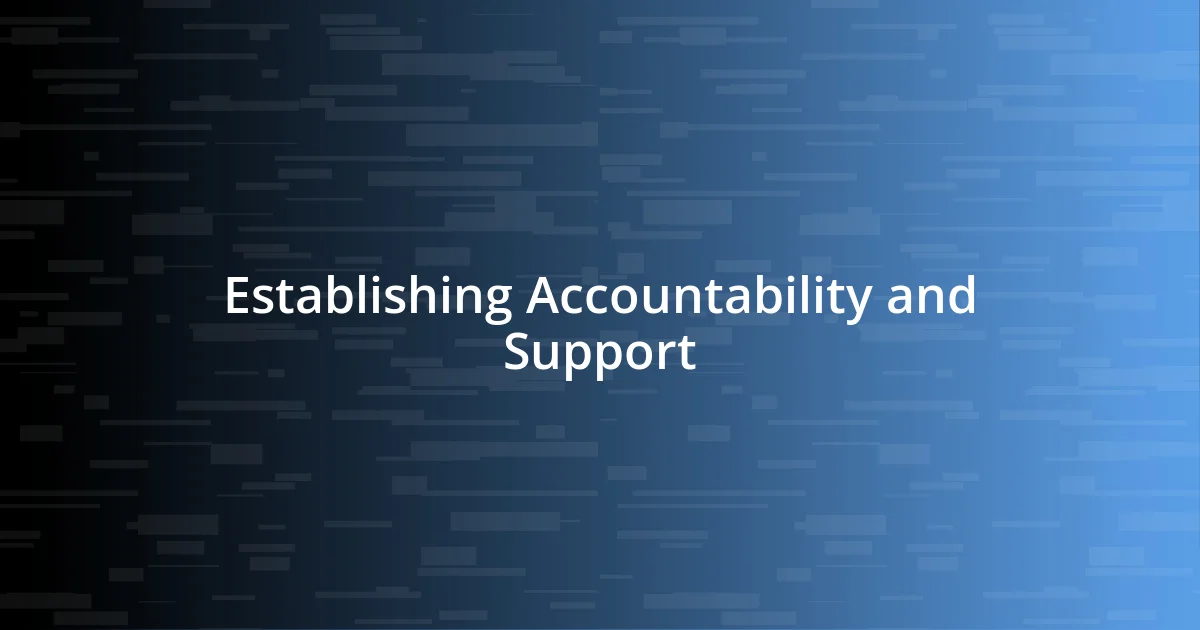
Establishing Accountability and Support
Establishing accountability is crucial in any budgeting effort. I remember when I first started budgeting, I was all over the place with my spending. It wasn’t until I partnered with a friend to review each other’s budgets that I truly felt the weight of responsibility. We set up weekly check-ins, where we shared our wins and struggles like teammates celebrating milestones. Have you ever found that another person’s insight made you rethink your choices? This shift not only kept me accountable but also transformed budgeting into a shared journey rather than a solitary task.
Support, however, goes beyond mere accountability; it’s about building a safety net. I’ll never forget the moment I shared my budget with my sister, not just to seek advice, but to invite her into my world. The floodgates opened. She shared her own challenges, and in that exchange, I felt understood and empowered. Suddenly, my budget wasn’t just a list of numbers; it was a living document that reflected both of our goals and dreams. How often do you connect with someone about your financial goals? Embracing support helped me realize that vulnerability can lead to strength, and finding allies in this process has made my budgeting so much richer.
Lastly, I’ve seen firsthand how creating a sense of community can enhance accountability and support. A few months ago, I joined a local group focused on financial literacy. Sharing my journey with others who were also facing challenges was incredibly uplifting. We tackled tough topics like debt and savings strategies while celebrating each other’s victories, big and small. Have you thought about forming or joining a group to talk about budgeting? The encouragement I received during those meetings reminded me that no one has to navigate this path alone. Together, we not only held each other accountable, but we also fostered a supportive environment where everyone felt valued and heard.












